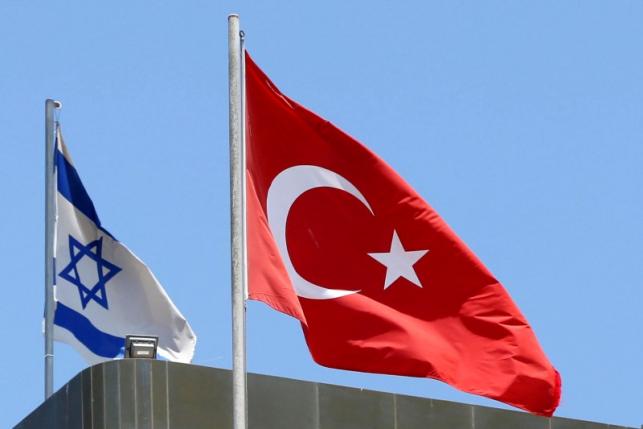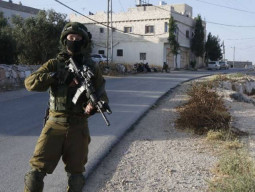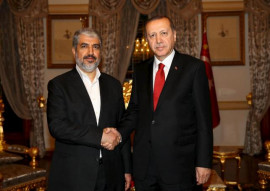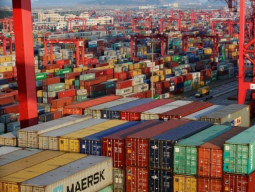
The highly anticipated agreement comes six years after an Israeli raid that killed 10 Turkish activists as an aid flotilla sought to run the blockade on the Gaza Strip.
Both sides have been pushing to complete the deal in recent months, with Israel in search of a potential customer for its offshore gas exports and NATO member Turkey wanting to restore its regional clout, analysts say.
Israel clashes with Palestinians on Gaza border: army
The United States has also pushed for the two countries to resolve the dispute as it seeks cooperation in the fight against extremists from the Islamic State group.
Speaking to AFP on condition of anonymity, the Israeli official said the agreement had been finalised but that details would not be officially announced until Monday.
Negotiations were said to have been held in Rome, where Israeli Prime Minister Benjamin Netanyahu landed for talks with US Secretary of State John Kerry on Sunday.
The agreement between the Muslim majority country and the Jewish state was expected to go before Israel's security cabinet for approval on Wednesday.
Turkish Prime Minister Binali Yildirim is expected to talk about the Israel reconciliation deal at 1:00 pm (1000 GMT) in Ankara on Monday, a Turkish official said.
The Turkish official confirmed that "the prime minister will talk about the contents of the Turkey-Israel agreement at tomorrow's press conference."
Two of Turkey's key conditions for normalisation -- an apology and compensation -- were largely met earlier, leaving its third demand, that Israel lift its blockade on the Hamas-run Gaza Strip, the main obstacle left.
Reports in recent days described a compromise on the issue.
Under the reported terms of the deal, Israel will allow the completion of a much-needed hospital in Gaza, as well as the construction of a new power station and a desalination plant for drinking water.
Turkey’s Erdogan meets Hamas leader Meshaal in Istanbul
Turkey's aid to Gaza would also be channelled through the Israeli port of Ashdod rather than sending it directly to the Palestinian enclave, the reports said.
Turkey has also committed to keeping Islamist movement Hamas from carrying out activities against Israel from its country, Israeli newspaper Haaretz reported Sunday.
Hamas would continue to be able to operate from Turkey for diplomatic purposes, the paper said.
Israel has committed to depositing some $20 million in a fund for compensation for the Turkish victims' families, the Israeli official said, ending all claims against Israeli soldiers.
Netanyahu has also come under pressure within Israel not to agree to the deal if it does not include provisions for Hamas to hand over four missing Israelis, including the remains of two soldiers presumed dead and two civilians believed held alive by Hamas in Gaza.
The Israeli official said Turkish President Recep Tayyip Erdogan agreed to instruct "all relevant Turkish agencies to help resolve the issue of Israel's missing citizens."
The deal is to result in the restoration of ambassadors, the Israeli official said.
Previously tight relations between Israel and Turkey were significantly downgraded after Israeli commandos staged a botched pre-dawn raid on the six-ship flotilla in May 2010 as it tried to run the blockade on Gaza.
Nine activists aboard the Turkish-owned Mavi Marmara ferry were killed, with a 10th person later dying of his wounds.
The talks to restore ties, ongoing for months, have been accompanied by a change in tone from Erdogan.
Erdogan, a stout defender of the Palestinian cause, in July 2014 accused Israel of "keeping Hitler's spirit alive" over its offensive in the Gaza Strip that summer.
He has more recently said that "we, Israel and the Palestinians and the region have a lot to win from a normalisation process."
Major powers meet to revive moribund Israeli-Palestinian peacemaking
The about-turn came amid a drastic worsening of ties between Turkey and Russia following Ankara's downing of a Russian warplane over Syria on November 24, which wrecked several joint cooperation projects including on energy.
Israel was also motivated to find new allies in the region, in part due to a need for export partners for its natural gas. There has been talk of building a pipeline to Turkey.
It has also found itself under increasing pressure over the lack of any progress on peace efforts with the Palestinians and has sought to build relationships with regional countries partly to counter such criticism.
In addition, normalised ties could open opportunities for further cooperation between NATO and Israel since Turkey's objections would be lifted, analysts say.
Israel imposed its blockade on Gaza in June 2006 after Palestinian militants there kidnapped an Israeli soldier. The restrictions were tightened a year later when Hamas took control of the enclave.
There have been three wars between Israel and Palestinian militants in Gaza since 2008, including a devastating 50-day conflict in the summer of 2014.












































COMMENTS
Comments are moderated and generally will be posted if they are on-topic and not abusive.
For more information, please see our Comments FAQ